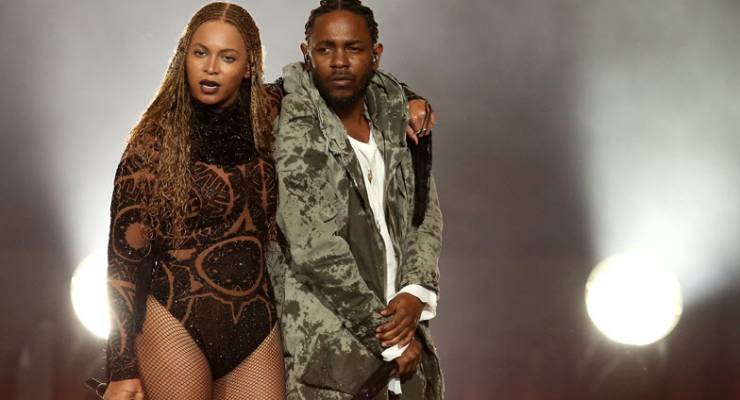
Rapper Kendrick Lamar has taken out 2018’s Pulitzer Prize for music, the first musician outside the rarefied atmosphere of jazz and classical to do so.
Among the chin-stroking pieces about what all this means, The New Yorker‘s Doreen St. Félix probably got it best — “the award is a bigger event for the Pulitzers than it is for Lamar, or for hip-hop’s morale”. The most surprising thing is that the Pulitzers have stepped outside their usual musical territory into popular music. Once that decision was made, the award would absolutely have to go to a rapper.
This represents, if anything, the conclusive end of any claim rock and roll had to the musical zeitgeist. It the last few years the only artists to do something genuinely new with the album format — to disrupt what pop music can be — have been Kanye West (with his ever-changing gospel record The Life of Pablo), the now impossible to categorise colossus Beyonce (with her multimedia tour de force Lemonade) and Lamar. When was the last time a rock and roll band attracted that combination of cultish fan base, critical adulation and monster sales? Radiohead, maybe?
That said, if it was going to be a rapper, it had to be this one. Lamar is the greatest lyricist, probably in any genre, of his generation. This mastery is as much about form as it is lyrical content; his phrasing, his use of tone, his skill at exploiting the rhythmic possibilities of any given piece of music are all peerless. In content, Lamar, is in many ways the apotheosis of what draws a lot of people to hip hop; he vividly melds the personal and political through direct, personal storytelling.
And it is storytelling that Lamar does, not bland autobiography. A strange double standard one consistency encounters with regard to hip hop is that its sometimes troubling content is being automatically endorsed. When Nick Cave smashes Kylie’s head in with a rock, or Johnny Cash shoots a man in Reno just to watch him die, we laud them as dark, vivid storytellers. I don’t see why we shouldn’t grant the same of Lamar and his cohorts.
Lamar is tough to introduce to non hip hop fans. He’s singular — not exactly inaccessible, but he’s not a pop savvy impresario like Kanye West, nor a handsome crooner like Drake. If you’re on board, it’s on his terms. To play someone Lamar’s masterpiece To Pimp a Butterfly — a sprawling celebration of black American music full of jazz, p-funk, blaxploitation influences, and an emotional first person account a of black American experience — as their introduction to the genre poses the same risk as showing someone who doesn’t like war films Apocalypse Now. They are as likely to find it long, strange and confronting, as they are to find it transcendent. The album that got him his gong, DAMN. is more straightforward than Butterfly, but it’s still far from easy listening.
The Bob Dylan comparison (Dylan was famously awarded the Nobel Prize for Literature last year) is apt in a few ways — aside from their shared mastery of language, Lamar is also perpetually restless, ditching one sonic palette for another from album to album. But it’s also hard to imagine Lamar ever being afflicted by anything like the storm that engulfed Dylan when he “went electric”.
Indeed, if the restless invention of Kanye West’s output (to pick one example) is anything to go by, hip hop by its very nature is a series of ever-evolving portmanteaus; at its inception it’s a snobbery-free assimilation of sounds, tones and styles. No other genre has a sonic palette so broad that artists as diverse as say, Aesop Rock and Lil Wayne could be meaningfully encapsulated — except, as it happens, Jazz and Classical. As such, hip hop doesn’t demand purity.
Hip hop, no matter how establishment it gets (the Pulitzer joins three Oscars in the hip hop cabinet) resists the “Elvis goes to the army moment” in a way rock and roll no longer can — it’s still mutating away from being absorbed into respectability.
And because of this, hip hop is the only genre with mass appeal left where anything is possible; it can be grand or conversational, deal with systemic prejudice, or the minutiae of life as it’s lived; it can be bleak or hilarious, a grand narrative or deeply personal. In the hands of a master like Lamar, it’s all these things from one breath to another.








I didn’t know who he was so had a sample. Total crap.
Yep agree. I must be missing something.
Yep agree. I must be missing something.
The people judging the Pulitzer prize didn’t think so. Nor do I. I think he’s a genius.
…but I guess that’s what makes the world…different opinions.
Might want to edit that Aesop Rock reference to A$AP Rocky! https://en.wikipedia.org/wiki/ASAP_Rocky
Er, Aesop Rock is also a rapper.
You are Lamar’s Mum and I claim my $5
For the nay sayers here, good rap is best served live; passion and conviction just doesn’t seem to come across to me in recordings.
Lamar’s unassuming style focuses a lot more on social injustices without being preachy, less on egotistical mesogynism, which seemed to be the failing of all the other male rappers. The only other that comes close for me is NAS.
Well deserved success and award.